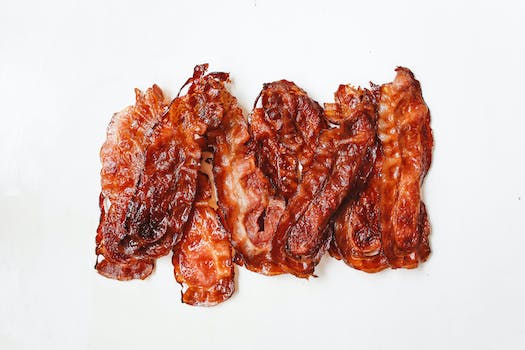
- 1. Introduction
- 1.1. What is a low carb meal plan?
- 1.2. Why is it important for your health?
- 1.3. Benefits of following a low carb meal plan
- 1.4. How to create an effective low carb meal plan
- 1.5. Tips for sticking to a low carb meal plan
- 2. Key Components of a Low Carb Meal Plan
- 2.1. Choosing the right carbohydrates
- 2.2. Incorporating protein-rich foods
- 2.3. Including healthy fats
- 2.4. Emphasizing non-starchy vegetables
- 2.5. Avoiding processed foods and added sugars
- 3. Sample Low Carb Meal Plan and Menu
- 3.1. Breakfast options
- 3.2. Lunch ideas
- 3.3. Dinner recipes
- 3.4. Snack suggestions
- 3.5. Beverage choices
1. Introduction
A low carb meal plan and menu can be a powerful tool to improve your health. By reducing your intake of carbohydrates, you can revitalize your body and achieve various health benefits. Whether you want to lose weight, manage diabetes, or simply adopt a healthier lifestyle, a low carb meal plan can be your key to success. This article will guide you through the process of creating an effective low carb meal plan and menu that will help you achieve your health goals. Let’s dive in and discover the numerous benefits of incorporating a low carb diet into your life.
1.1. What is a low carb meal plan?
A low carb meal plan is a dietary approach that focuses on reducing the intake of carbohydrates while increasing the consumption of proteins and fats. It involves limiting the consumption of foods such as bread, pasta, rice, and sugary snacks, which are high in carbohydrates. Instead, the emphasis is placed on consuming foods that are rich in protein, such as lean meats, fish, eggs, and dairy products, as well as healthy fats from sources like avocados, nuts, and olive oil.
By following a low carb meal plan and menu to improve your health, you can experience various benefits. It can help with weight loss, as reducing carb intake can lead to a decrease in overall calorie consumption. This can be especially beneficial for individuals looking to shed excess pounds or maintain a healthy weight.
Furthermore, a low carb meal plan can enhance blood sugar control and insulin sensitivity, making it a suitable option for individuals with diabetes or insulin resistance. It can help stabilize blood sugar levels and prevent spikes and crashes, leading to improved energy levels throughout the day.
Additionally, a low carb meal plan can promote better heart health by reducing the risk factors associated with cardiovascular diseases. It can lower blood pressure, improve cholesterol levels, and decrease triglyceride levels, thus reducing the likelihood of heart-related complications.
Overall, a low carb meal plan and menu can revitalize your health by promoting weight loss, regulating blood sugar levels, and improving heart health. By incorporating delicious and nutritious low carb meals into your daily routine, you can achieve your health goals while still enjoying satisfying and flavorful food.
1.2. Why is it important for your health?
A low carb meal plan and menu can significantly improve your health. By reducing the intake of carbohydrates, you can experience a range of health benefits. Carbohydrates, especially refined ones, can lead to weight gain, increased blood sugar levels, and a higher risk of chronic diseases such as diabetes and heart disease. By following a low carb meal plan, you can promote weight loss, stabilize blood sugar levels, and reduce the risk of developing these conditions. Additionally, a low carb diet can improve your energy levels, enhance mental clarity, and support overall well-being. Incorporating a variety of nutrient-dense foods such as lean proteins, healthy fats, and non-starchy vegetables can provide the necessary nutrients while keeping your carb intake in check. Overall, adopting a low carb meal plan and menu is crucial for improving your health and well-being.
1.3. Benefits of following a low carb meal plan
A low carb meal plan and menu can have numerous benefits for improving your health. By reducing your intake of carbohydrates, you can effectively manage your weight, regulate blood sugar levels, and promote better overall health. This type of meal plan focuses on consuming foods that are low in carbohydrates but high in protein, healthy fats, and fiber. By following a low carb meal plan, you can experience increased energy levels, improved digestion, and reduced cravings for unhealthy foods. Additionally, this type of eating plan has been linked to improved heart health, lower cholesterol levels, and reduced risk of chronic diseases such as diabetes and obesity. Overall, incorporating a low carb meal plan and menu into your lifestyle can be a powerful tool in revitalizing your health and promoting overall well-being.
1.4. How to create an effective low carb meal plan
A low carb meal plan and menu can greatly improve your health by promoting weight loss, stabilizing blood sugar levels, and reducing the risk of chronic diseases. By reducing your intake of carbohydrates and focusing on consuming healthy fats and proteins, you can revitalize your health and achieve your weight loss goals. In this article, we will guide you on how to create an effective low carb meal plan that will not only help you shed those extra pounds but also improve your overall well-being.
1.5. Tips for sticking to a low carb meal plan
Sticking to a low carb meal plan and menu can greatly improve your health. By reducing your intake of carbohydrates, you can effectively manage your weight, regulate blood sugar levels, and boost your energy levels. However, sticking to a low carb meal plan can be challenging, especially if you are used to consuming a lot of processed foods and sugary snacks. To help you stay on track, here are some tips to make your low carb journey easier:
1. Plan your meals: Take some time to plan your meals for the week. This will ensure that you have all the necessary ingredients on hand and reduce the likelihood of reaching for unhealthy carb-rich options.
2. Stock up on low carb foods: Fill your pantry and refrigerator with plenty of low carb options such as vegetables, lean proteins, and healthy fats. This will make it easier for you to create delicious and nutritious low carb meals.
3. Prep in advance: Spend some time on the weekends prepping your meals for the week. Cut up vegetables, cook proteins, and portion out your meals so that they are ready to grab and go.
4. Find low carb alternatives: Explore low carb alternatives for your favorite high-carb foods. For example, cauliflower rice can replace regular rice, zucchini noodles can substitute for pasta, and lettuce wraps can be used instead of tortillas.
5. Stay hydrated: Drinking plenty of water throughout the day can help curb cravings and keep you feeling full. It can also support your body’s natural detoxification processes.
By following these tips, you can successfully stick to a low carb meal plan and menu, improve your health, and achieve your desired goals.
2. Key Components of a Low Carb Meal Plan
A low carb meal plan is a great way to improve your health and revitalize your body. By reducing your intake of carbohydrates, you can achieve weight loss, lower blood sugar levels, and increase energy levels. But what are the key components of a low carb meal plan? Let’s take a closer look.
1. Lean Proteins: A low carb meal plan should include plenty of lean proteins such as chicken, turkey, fish, and tofu. These protein sources are low in carbohydrates and high in nutrients, making them an essential part of a healthy low carb diet.
2. Non-Starchy Vegetables: Fill your plate with non-starchy vegetables like leafy greens, broccoli, cauliflower, zucchini, and bell peppers. These vegetables are low in carbs and packed with vitamins, minerals, and fiber, providing you with the necessary nutrients while keeping your carb intake in check.
3. Healthy Fats: Contrary to popular belief, fats are an important component of a low carb meal plan. Opt for healthy fats like avocados, olive oil, nuts, and seeds. These fats provide satiety, promote brain health, and support weight loss.
4. Whole Grains (in moderation): While a low carb meal plan aims to limit carb intake, it doesn’t mean you have to eliminate all grains. Include a small portion of whole grains like quinoa, brown rice, or oats in your meal plan for added fiber and nutrients.
5. Low Carb Snacks: Snacking is a common habit, and it’s important to choose low carb options that keep you satisfied. Opt for snacks like Greek yogurt, hard-boiled eggs, cheese, nuts, or sliced vegetables with hummus.
By incorporating these key components into your low carb meal plan, you can create a balanced and effective menu that improves your health and helps you achieve your wellness goals.
2.1. Choosing the right carbohydrates
Choosing the right carbohydrates is a crucial aspect of a low carb meal plan and menu to improve your health. When following a low carb diet, it is important to focus on consuming carbohydrates that have a lower glycemic index. These types of carbohydrates are digested and absorbed more slowly, resulting in a slower and steadier release of glucose into the bloodstream.
To choose the right carbohydrates, opt for whole grains such as quinoa, brown rice, and whole wheat bread instead of refined grains like white rice and white bread. Whole grains provide more fiber, vitamins, and minerals while having a lower impact on blood sugar levels.
Additionally, include plenty of non-starchy vegetables in your low carb meal plan. Vegetables like leafy greens, broccoli, cauliflower, and bell peppers are low in carbs and high in nutrients. They provide essential vitamins, minerals, and antioxidants without significantly spiking blood sugar levels.
Furthermore, incorporate healthy sources of protein into your low carb meal plan. Lean meats, poultry, fish, eggs, and tofu are excellent options. These protein-rich foods help keep you feeling full and satisfied while supporting muscle growth and repair.
In conclusion, choosing the right carbohydrates, including whole grains and non-starchy vegetables, along with incorporating protein-rich foods, is essential for a successful low carb meal plan and menu to improve your health.
2.2. Incorporating protein-rich foods
Incorporating protein-rich foods is a key component of a low carb meal plan and menu to improve your health. Protein is essential for various bodily functions and can help you feel fuller for longer, making it an important element in a well-balanced diet.
Including sources of lean protein such as chicken, turkey, fish, tofu, and eggs in your low carb meals can provide the necessary nutrients while keeping your carbohydrate intake in check. These protein-rich foods not only help in building and repairing tissues but also support muscle growth and maintenance.
Additionally, incorporating protein-rich foods in your low carb meal plan can aid in weight management. High-protein meals have been found to increase satiety and reduce cravings, leading to a reduced calorie intake. This, in turn, can contribute to weight loss and improved overall health.
When planning your low carb meals, consider including protein-rich snacks such as Greek yogurt, cottage cheese, or nuts to keep you fueled throughout the day. These snacks can provide a quick and easy source of protein while keeping your carbohydrate intake minimal.
In conclusion, a low carb meal plan and menu that incorporates protein-rich foods can be highly beneficial for improving your health. By focusing on lean protein sources and including them in your meals and snacks, you can support your body’s needs while maintaining a balanced and nutritious diet.
2.3. Including healthy fats
Including healthy fats in a low carb meal plan is essential for improving your health. Healthy fats provide numerous benefits, such as boosting brain function, reducing inflammation, and promoting heart health. When creating your low carb menu, be sure to incorporate sources of healthy fats such as avocados, nuts and seeds, olive oil, and fatty fish like salmon. These fats not only add flavor and richness to your meals, but they also help you feel satisfied and full for longer periods, preventing unnecessary snacking and overeating. By including healthy fats in your low carb meal plan, you can revitalize your health and enjoy the benefits of a balanced and effective diet.
2.4. Emphasizing non-starchy vegetables
Emphasizing non-starchy vegetables is a crucial aspect of a low carb meal plan and menu to improve your health. These vegetables are low in carbohydrates and high in essential nutrients, making them an excellent choice for a wholesome and satisfying meal. Non-starchy vegetables such as leafy greens, broccoli, cauliflower, peppers, and cucumbers are not only delicious but also packed with vitamins, minerals, and fiber. By including a variety of non-starchy vegetables in your low carb meal plan, you can enhance the nutritional value of your meals while keeping your carbohydrate intake in check. So, make sure to prioritize non-starchy vegetables as key components of your low carb meal plan and menu to revitalize your health.
2.5. Avoiding processed foods and added sugars
Avoiding processed foods and added sugars is a key component of a low carb meal plan and menu to improve your health. Processed foods, such as packaged snacks, sugary drinks, and pre-packaged meals, are often high in refined carbohydrates and unhealthy fats. These foods can lead to weight gain, increased inflammation, and an increased risk of chronic diseases like diabetes and heart disease.
In addition to avoiding processed foods, it is important to minimize the consumption of added sugars. Added sugars, found in sugary beverages, desserts, and many processed foods, provide empty calories and can contribute to weight gain and blood sugar imbalances. High sugar intake has been linked to an increased risk of obesity, type 2 diabetes, and other health issues.
By focusing on whole, unprocessed foods and avoiding added sugars, a low carb meal plan can help revitalize your health. This type of meal plan emphasizes nutrient-dense foods like lean proteins, vegetables, healthy fats, and low glycemic index fruits. It promotes stable blood sugar levels, weight loss, improved energy levels, and reduced inflammation. Incorporating a variety of colorful vegetables, lean proteins like chicken and fish, and healthy fats like avocado and olive oil can provide the necessary nutrients for optimal health.
Remember, when following a low carb meal plan, it’s important to consult with a healthcare professional or nutritionist to ensure it aligns with your specific dietary needs and health goals. Additionally, staying hydrated, getting regular physical activity, and practicing portion control are essential components of a successful low carb meal plan.
3.1. Breakfast options
Breakfast is often considered the most important meal of the day, and when you’re following a low carb meal plan, there are plenty of delicious options to choose from. Starting your day with a nutritious and satisfying breakfast can help improve your overall health and keep you feeling energized throughout the day.
Here are some breakfast ideas that are low in carbs but high in flavor:
1. Veggie omelet: Whip up a tasty omelet using eggs, spinach, bell peppers, and mushrooms. This protein-packed breakfast will keep you full and provide essential nutrients to kickstart your day.
2. Greek yogurt with berries: Opt for plain Greek yogurt and add a handful of fresh berries for a low carb and antioxidant-rich breakfast. Sprinkle some chia seeds or nuts for an extra crunch.
3. Avocado and smoked salmon: Slice half an avocado and top it with smoked salmon for a filling and healthy breakfast. This combination is not only delicious but also packed with omega-3 fatty acids.
4. Low carb smoothie: Blend together unsweetened almond milk, spinach, protein powder, and a small portion of berries for a refreshing and low carb smoothie. It’s a great way to get your greens in the morning.
Remember, a low carb meal plan and menu can be a great way to improve your health. By choosing nutritious and low carb options for breakfast, you’ll be on your way to revitalizing your health and feeling your best.
3.2. Lunch ideas
A low carb meal plan and menu can be an effective way to improve your health and revitalize your body. By reducing your intake of carbohydrates, you can promote weight loss, regulate blood sugar levels, and increase energy levels. Here is a sample low carb meal plan and menu to help you get started:
– Breakfast: Start your day with a protein-rich omelette made with eggs, spinach, and cheese. Pair it with a side of avocado slices for added healthy fats.
– Snack: Enjoy a handful of mixed nuts for a satisfying and nutritious snack.
– Lunch: Opt for a salad loaded with leafy greens, grilled chicken, and a variety of colorful vegetables. Drizzle with a low carb dressing or olive oil and vinegar.
– Snack: Have a serving of Greek yogurt topped with berries for a creamy and antioxidant-rich treat.
– Dinner: Indulge in a delicious salmon fillet seasoned with herbs and served with roasted broccoli and cauliflower.
– Dessert: Treat yourself to a sugar-free Jello topped with whipped cream for a guilt-free sweet ending to your day.
By following this low carb meal plan and menu, you can enjoy a wide range of tasty and satisfying meals while improving your overall health and well-being.
3.3. Dinner recipes
A low carb meal plan and menu can be an effective way to improve your health. By reducing your intake of carbohydrates, you can help regulate your blood sugar levels, promote weight loss, and increase your energy levels. Here is a sample low carb meal plan and menu to get you started on your journey to revitalizing your health:
Day 1:
– Breakfast: Scrambled eggs with spinach and feta cheese
– Lunch: Grilled chicken salad with mixed greens, avocado, and cherry tomatoes
– Snack: Celery sticks with almond butter
– Dinner: Baked salmon with roasted asparagus
Day 2:
– Breakfast: Mushroom and cheese omelette
– Lunch: Turkey lettuce wraps with cucumber and bell peppers
– Snack: Greek yogurt with berries
– Dinner: Grilled steak with sautéed mushrooms and a side of steamed broccoli
Day 3:
– Breakfast: Spinach and mushroom frittata
– Lunch: Zucchini noodles with shrimp and pesto
– Snack: Hard-boiled eggs
– Dinner: Baked chicken thighs with cauliflower rice
Remember to consult with a healthcare professional or a registered dietitian before starting any new meal plan, especially if you have any underlying health conditions or dietary restrictions. Enjoy your low carb meals and watch as your health begins to improve!
3.4. Snack suggestions
Snack suggestions for a low carb meal plan and menu to improve your health:
1. Nuts and seeds: Almonds, walnuts, pumpkin seeds, and sunflower seeds are all excellent low carb snacks. They provide a good amount of healthy fats and protein, which can help keep you feeling full and satisfied.
2. Greek yogurt: Opt for plain, unsweetened Greek yogurt as a low carb snack option. It is high in protein and low in carbs, making it a great choice for those following a low carb meal plan.
3. Cheese: Cheese is a delicious and satisfying snack for a low carb diet. Choose varieties that are low in carbs, such as cheddar, mozzarella, or Swiss cheese.
4. Vegetables with dip: Snack on raw vegetables like celery, cucumber, and bell peppers with a low carb dip, such as ranch or guacamole. This combination provides a good amount of fiber and nutrients.
5. Hard-boiled eggs: Hard-boiled eggs are an easy and convenient snack option for a low carb meal plan. They are packed with protein and healthy fats, making them a nutritious choice.
Remember to choose snacks that are low in carbs and high in nutrients to support your health and maintain a balanced low carb meal plan.
3.5. Beverage choices
When following a low carb meal plan and menu to improve your health, it is important to make wise beverage choices. Many beverages contain added sugars and carbohydrates, which can hinder your progress. Instead, opt for hydrating options that are low in carbs and sugar. Water is always a great choice as it has zero carbs and calories. Additionally, herbal teas and unsweetened coffee can be enjoyed without derailing your low carb goals. If you prefer flavored beverages, consider infusing water with fruits or adding a splash of lemon or lime juice. Just be cautious with fruit juices as they can contain high amounts of sugar. By making smart beverage choices, you can enhance the effectiveness of your low carb meal plan and menu, ultimately revitalizing your health.


